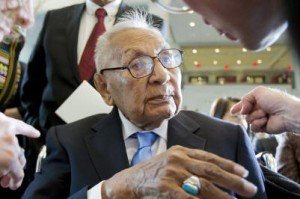During the dark, early days of World War II, American military commanders were desperate for a code that could not be cracked by the Japanese. The solution rested in the obscure languages spoken by Native American tribes, unfathomable to the Japanese. Native American code talkers, as they became known, were able to transmit messages quickly and securely, giving American forces a critical edge.
While the contributions of Navajo Code Talkers have been honored by Congress and featured in films, the role of dozens of other Native American tribes has been overlooked. But on November 21, 2013, Congressional Gold Medals, the nation’s highest civilian honor, were awarded honoring the service of hundreds of overlooked code talkers from 33 tribes.
Native American calls and whoops of pride echoed through Emancipation Hall when tribal representatives, some wearing headdresses or other traditional clothing, received the medals in front of an audience of hundreds. Few of the code talkers are still living, and only one was present for the ceremony.
Edmund Harjo, 96 a member of the Seminole Nation of Oklahoma, served as a radio man with the 195th Field Artillery Battalion in France. Harjo, who attended in a wheelchair and received an ovation from the audience said afterward that the honor was appreciated but belated.
‘If I was young, I would enjoy it,” he said.
It’s a long time coming, ‘said Leroy Shingoitewa, 71. a member of the Hopi Tribe who has several uncles who served as code talkers.
“When the came home, they didn’t talk much about it, ” he said. “Finally, it’s become known.”
The United States first used Native American code talkers during World War I in October 1918, when the country used Choctaws to transmit messages confounding to the Germans. The idea was reborn during World War II, when the Marine Corps recruited several hundred Navajos to serve in the Pacific.
The Army used Comanche to develop a secret code based on their language, while members of other tribes were assigned to special native language communication duty.
Estimates place the number of Native American code talkers who served in the two wars at more than 400, according to the Defense Department. The code talkers’ role was kept classified for many years. “They returned heroes, but without a hero’s welcome,” said Rep. Ron Kind (D-Wis.). Navajo code talkers, who served in the largest numbers, were awarded the gold medal in 2001 at a ceremony in the Capitol Rotunda presided over by President George W. Bush.
In subsequent years, congressional representatives from states with large Native American populations, including Oklahoma and South Dakota, pushed for recognition of other tribes. Congress passed legislation authorizing gold medals to other tribes in 2008, but it took years for the Pentagon to research which tribes were eligible because no central records about code talkers exist.
Tribes and nations honored include the Comanche, Cherokee, Sioux, Choctaw, Hopi, Kiowa, Creek, Oneida, Osage, Pawnee, Ponca, Pueblo,
Sac and Fox, Seminole, Apache, Crow, Tlingit, Chippewa, Menominee and Mohawk.
The code talkers “embraced their cultural heritage and used it to prevent highly sensitive wartime messages from being intercepted by the enemy, ” said Rep. Tom Cole (R-Okla.), a member of the Chickasaw Nation and co-chair of the Native American Congressional Caucus. More tribes could be added based on further research, but with the code talker numbers dwindling and their immediate families aging, officials decided not to delay further, according to congressional aides.
“It’s a great feeling down here,” said Robert Atchavit, a Comanche from Oklahoma, patting his heart.
